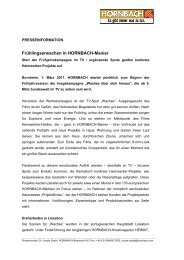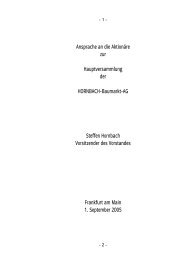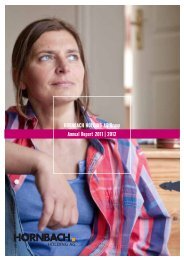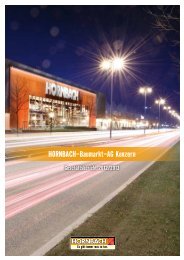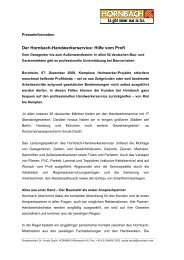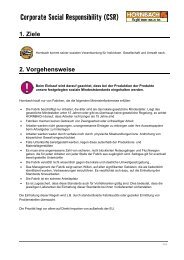Hornbach-Baumarkt-AG Group
PDF, 3,6 MB - Hornbach Holding AG
PDF, 3,6 MB - Hornbach Holding AG
- No tags were found...
You also want an ePaper? Increase the reach of your titles
YUMPU automatically turns print PDFs into web optimized ePapers that Google loves.
144 NOTES TO THE CONSOLIDATED FINANCIAL STATEMENTS Other Disclosures<br />
Foreign currency risk<br />
Foreign currency risks, i.e. potential reductions in the value of a financial instrument or future cash flow due<br />
to changes in foreign exchange rates, particularly apply wherever monetary financial instruments, such as<br />
receivables or liabilities, exist in a currency other than the local currency of the company, or will exist in the<br />
scheduled course of business. The foreign currency risks of the HORNBACH-<strong>Baumarkt</strong>-<strong>AG</strong> <strong>Group</strong> mainly result<br />
from financing measures and from the company’s business operations. Exchange rate differences arising<br />
from the translation of financial statements into the group currency do not constitute a foreign currency risk<br />
as defined by IFRS 7.<br />
The group companies are largely financed by means of external financing measures denominated in the<br />
functional currency of the corresponding group company (natural hedging). Moreover, there are also intragroup<br />
loans denominated in euros, thus resulting in foreign currency risks at those group companies which<br />
have a functional currency other than the euro. These risks are basically not hedged.<br />
The foreign currency risks faced by the HORNBACH-<strong>Baumarkt</strong>-<strong>AG</strong> <strong>Group</strong> in its business operations mainly<br />
relate to the purchase of goods in the Far East using US dollars and from intragroup supplies and services,<br />
which are basically handled in euros. The US dollar currency risk is hedged using forward exchange transactions<br />
and fixed deposits denominated in US dollars.<br />
Including hedging measures, the <strong>Group</strong> had the following main foreign currency items open as of the balance<br />
sheet date:<br />
€ 000s 2.28.2013 2.29.2012<br />
EUR (31,057) (19,969)<br />
USD 7,250 5,457<br />
CZK (519) (428)<br />
The most important exchange rates have been presented on Page 101.<br />
In the sensitivity analysis provided below for foreign currency risks, it has been assumed that the foreign<br />
currency holdings as of the balance sheet date are representative of the financial year as a whole.<br />
If the euro had appreciated by 10% compared with the <strong>Group</strong>’s other main currencies at the balance sheet<br />
date, and all other variables had remained unchanged, consolidated earnings before taxes would have been<br />
€ 3,236k lower (2011/2012: € 2,599K). Conversely, if the euro had depreciated by 10% compared with the<br />
<strong>Group</strong>’s other main currencies at the balance sheet date, and all other variables had remained unchanged,<br />
then consolidated earnings before taxes would have been € 3,236k higher (2011/2012: € 2,599k). The hypothetical<br />
impact on earnings of € +3,236k (2011/2012: € +2,599k) is the result of the following sensitivities:<br />
EUR/RON € 3,659k (2011/2012: € 3,613k), EUR/CHF € -432k (2011/2012: € -2,055k), EUR/USD € 288k<br />
(2011/2012: € 546k), EUR/CZK € -499k (2011/2012: € 299k), and EUR/SEK € 220k (2011/2012: € 196k).



